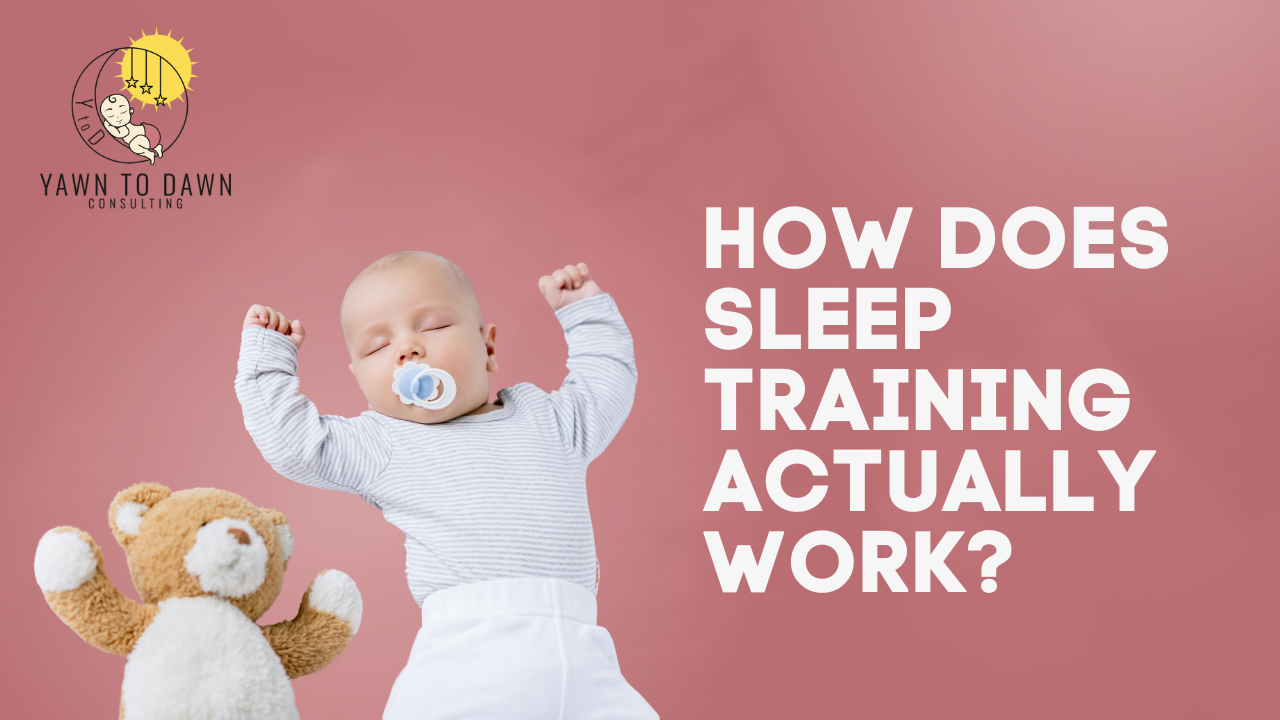How Does Sleep Training Actually Work?
Jun 29, 2025
Let’s get this out of the way sleep training is not about leaving your baby alone to cry their heart out until they give up. It’s also not about “teaching” them to sleep. Sleep is a natural, biological process. Your baby already knows how to sleep.
What they don’t know (yet) is how to fall asleep and go back to sleep without needing you to do the same thing on loop all night long.
That’s what sleep training helps with.
Nope, It’s Not “Cry It Out” or Giving Up
I hear this all the time:
“They just stop crying because they realise no one’s coming, right?”
Not true.
What’s actually happening is your baby is learning a new, more sustainable way to fall asleep—one that doesn’t need your boob, your arms, your rocking, or your constant presence.
When a baby is used to falling asleep with you doing all the things and then wakes up without those same things? It’s jarring. Of course they cry out. You would too.
Think of It Like This...
Think of someone who simply needs the TV humming in the background to fall asleep. They fall asleep on the couch with the TV on.
Now imagine waking they in their bed in the middle of the night no TV, no couch. They will get startled and uncomfortable.
They probably will go back out to put on the TV to fall asleep again.
That’s exactly what your baby feels when they fall asleep in your arms but wake up alone in their crib. They’re like, “Wait… where’s my bed? Where’s the milk? Why is it dark and quiet?!”
It’s not manipulation. It’s confusion.
Unless your baby learns to fall asleep in the crib by themselves, that same confusion (and crying) will repeat. All. Night. Long.
What Sleep Training Actually Does
Sleep training isn’t magic. It’s just habit change.
It gently helps your baby fall asleep using environmental sleep associations things that stay the same all night long instead of depending on you to recreate bedtime every 45 minutes.
Think:
- A cozy crib
- A breathable sleep sack
- White noise
- A dark, quiet room
- A calm, predictable wind-down routine
These cues signal to your baby: “You’re safe. It’s time to sleep.”
So when they naturally stir at night (as we all do), they look around, recognize the setup, and drift right back to sleep. No drama. No tears. No you doing backflips at 2 a.m.
Sleep Training is Learning How to Make A Sandwich (Yes, Really)
Imagine your baby is hungry.
They have everything they need for a sandwich… but they don’t know how to make one. So they cry. You make the sandwich. They eat. They’re happy.
Next time? Same thing.
Now imagine instead you sit with them. You guide them: spread the jam, stack the bread, hold the sandwich just right. Messy at first, sure. But soon, they figure it out.
Now? They’re making sandwiches on their own like a pro.
That’s exactly what sleep training does. It’s not about tough love. It’s about teaching, gently and consistently.
What the Research Says
Still feeling unsure? Here’s what science says:
- Babies wake the same number of times before and after sleep training.
- But after training, they cry a lot less because they’re not waking up startled by a completely different sleep setup (Mindell et al., 2006).
- A major 5-year follow-up study found zero negative effects on baby’s emotional health, bonding, or behavior (Hiscock et al., 2007).
- And moms who sleep-trained? They slept better and had better mental health (Hall et al., 2015). That’s a big win.
So, What’s the Takeaway?
Sleep training works. It’s not cold, harsh, or damaging. It’s a loving, structured way to help your baby fall asleep and stay asleep without needing you every single time they stir.
It’s about confidence. Independence. And honestly? Your peace of mind.
Whether you’re navigating this from a cozy HDB flat in Singapore or a shared room in India, I promise: with the right tools, you can do this.
Ready to Ditch the All-Nighters?
If you're tired of the rock-feed-repeat cycle and ready to sleep without guilt, I’d love to help.
As a baby sleep consultant Singapore parents trust, I work 1:1 with families across Singapore, India, and beyond.
Explore my 1:1 Sleep Training Program
Let’s help your baby (and you) get the rest you both deserve.
References
Hall, W. A., Hutton, E., Brant, R. F., Collet, J. P., Gregg, K., Saunders, R., & Ip, W. (2015). A randomized controlled trial of an intervention for infants’ behavioral sleep problems. BMC Pediatrics, 15, 181. https://doi.org/10.1186/s12887-015-0512-2
Hiscock, H., Bayer, J., Hampton, A., Ukoumunne, O. C., & Wake, M. (2007). Long-term mother and child mental health effects of a population-based infant sleep intervention: Cluster-randomized, controlled trial. Pediatrics, 119(3), 641–649. https://doi.org/10.1542/peds.2006-2564
Mindell, J. A., Kuhn, B., Lewin, D. S., Meltzer, L. J., & Sadeh, A. (2006). Behavioral treatment of bedtime problems and night wakings in infants and young children. Sleep, 29(10), 1263–1276. https://doi.org/10.1093/sleep/29.10.1263


